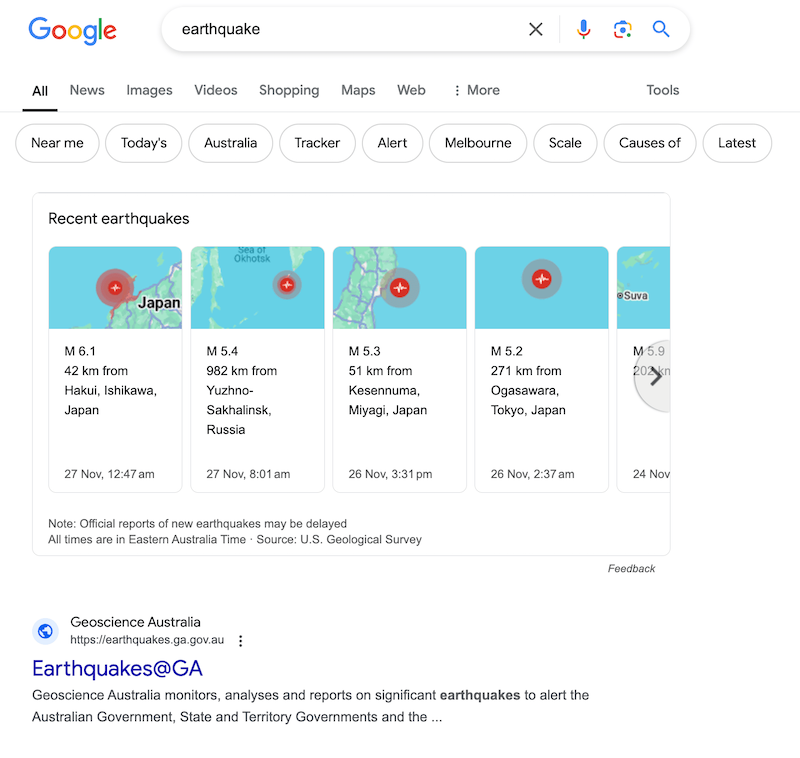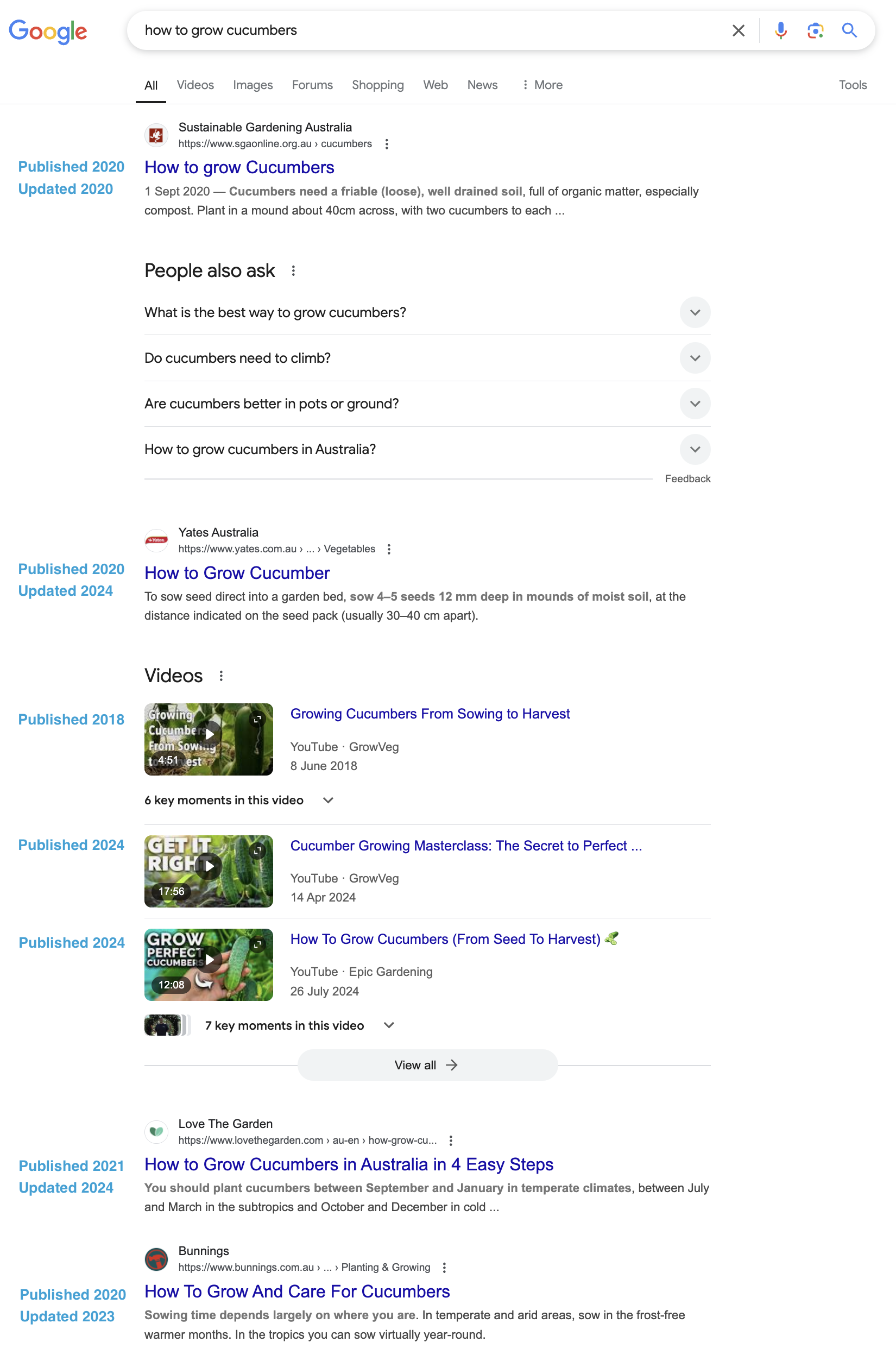I often get asked by clients how often they should be updating their content.
As a consultant, I frustratingly (and perhaps a little by habit) preface 90% of responses with, “Well…it depends” but in this case it really does.
While the notion that ‘Google loves fresh content’ holds some truth, I believe it’s often misunderstood, with many SEOs compounding the confusion by offering misguided recommendations.
Cut to the chase Andrew, whats the go?
If you ask a Librarian what the best book is on a topic, do they give you the best book or the newest?
Very old books can become outdated vs newer available information. Those books might not be as relevant over time, so thats when recency might be a consideration.
Good books often have ‘revisions’ where additional information in added, outdated info removed etc. This is positive, and the newer, more relevant information (if good) is what could make it better than another book - not necessarily just because it was updated recently.
When Fresh Content Does (and Doesn't) Matter
The idea that Google loves fresh content stems from specific (and quite significant) freshness ranking systems referred to as Query Deserves Freshness (QDF).
These systems are activated when the intent or context behind a query demands up-to-date information.
Recent Events can Trigger QDF
Google actually provides a really good example of QDF in their documentation based on the query ‘earthquake’, so I won’t stray from that.
If no significant earthquake has happened recently, the results will likely feature evergreen content covering broad informational intent like ‘What is an earthquake?’ or ‘How earthquakes work’.
However, if an earthquake has just occurred, the search results shift to real-time updates and news coverage. You’ll see this in your everyday use of Google but are probably conditioned to just expect and accept that Google serves you news content as it seamlessly matches your intent at the time.
This is QDF in action - Google serving fresh content when the context or intent of the query calls for it.

When Freshness Doesn't Matter
We can evidently see for ourselves that freshness isn’t valued by Google for the majority of searches.
For example, if someone searches for ‘how to grow cucumbers’, the best content on the topic will rank, not necessarily the newest or most recently updated.
The quality, depth, and relevance of the content take precedence over when it was last updated. The ranking article might be several years old, and that’s OK for Google and users if it’s still the most helpful.
 The top ranking article here hasn’t been updated in 5 years, the top ranking video is 7 years old
The top ranking article here hasn’t been updated in 5 years, the top ranking video is 7 years old
Why Relevance Matters More Than Freshness
Updating content is less about making it ‘fresh’ and more so ensuring the information is accurate, relevant, and reflective of the latest knowledge.
If there’s nothing to add to a page then it really is a waste of time making superficial updates as Google only values content that offers new insights or aligns with evolving user needs.
We can refer to this concept as ‘information gain’ - the idea that content should offer something new or unique that wasn’t previously available within the broader competitive landscape.
For example, if your page discusses a topic like sustainable gardening, a meaningful update might include new research on climate-resilient plants or recently published techniques that improve soil health. These additions provide users with fresh, valuable information they didn’t already have access to, aligning with Google’s goal of delivering the most useful and comprehensive answers to search queries.
Superficial changes, like rephrasing sentences or tweaking the headline, won’t satisfy this requirement.
Instead, it’s imperative to focus on improving content depth and relevance to ensure it continues to serve evolving user needs and offers something…well, different.
Little…yellow…different
Examples of Relevance in Action
- A roundup of the best PS5 games that excludes widely acclaimed newer high-end titles is less relevant compared to an article that includes more recent releases.
- A guide for the best cafes in melbourne, that lists only pre-pandemic favourites without mentioning newly opened, highly-rated hangouts or changes to existing ones is less relevant than a guide that reflects the current scene.
Users expect content to reflect the most accurate, up-to-date information. Irrelevant or outdated content leads to user dissatisfaction, higher bounce rates, and a negative signal to Google’s algorithm, which uses Chrome data to measure engagement.
Why You Can't Trick Google
I’m often asked if changing the published date or the opening sentence/paragraph to an article will be enough to trick Google into thinking content is refreshed.
This doesn’t work, because Content Hashing.
WTF is content hashing you ask.
When Google indexes your content, it creates a hash. A hash is a digital fingerprint of the content. It can detect how much has actually changed. Superficial edits, like swapping dates or reordering sentences, won’t fool the system.
User Signals Matter
If your updates don’t genuinely improve the content, users won’t stay, engage, or convert.
Google notices this through behavioural data, collected via Chrome, like bounce rates and time on page (well, actually it’s ‘time to return to serp’ but time on page is easier to convey).
Attempts to trick Google with superficial updates is a waste of time that will not only be superficial but can harm your site’s credibility over time.
The focus should always be on improving value for users, not gaming the system.
When (and How) to Update Content
So, when should you actually update content? Here’s why ‘it depends’.
Updating Statistics or Data
When new information becomes available, like updated statistics or recent research, your content should reflect this. If it’s valuable for you to rank highly for the query, then invest the time and respect users to provide accurate information.
Adding Valuable Sections
If you identify gaps in your content or see competitors covering topics you don’t, expand your article with additional sections that enhance its value.
A good way to gain these insights is to review what’s already ranking well (and above you) for your target keywords. Identify what resonates with users and consider how you could add something unique or more comprehensive to stand out above those.
Focus on Value, Not Freshness
The weight that SEO places on regularly updating content is misleading and a burden on resources that could be better used elsewhere for far better ROI.
Don’t waste time making superficial updates or changing dates in the hope of improving rankings.
Instead, focus on creating the best possible answer to your audience’s questions.
When your content consistently (and genuinely) serves users better than anyone else’s, the traffic and revenue follows. Every time.





